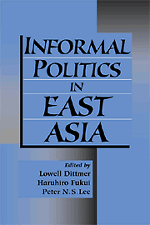Book contents
- Frontmatter
- Contents
- Preface
- Contributors
- INTRODUCTION: On the Significance of Informal Politics
- PART I Informal Politics in Industrialized Asian Democracies
- PART II Dictatorship with Chinese Characteristics: Macroperspectives
- 4 Psychocultural Foundations of Informal Groups: The Issues of Loyalty, Sincerity, and Trust
- 5 Informal Politics Among the Chinese Communist Party Elite
- 6 Formal Structures, Informal Politics, and Political Change in China
- 7 The Informal Politics of Leadership Succession in Post-Mao China
- PART III Case Studies in Chinese Corporatism
- PART IV Asian Authoritarianism on the Chinese Periphery
- CONCLUSION: East Asian Informal Politics in Comparative Perspective
- Glossary
- Index
5 - Informal Politics Among the Chinese Communist Party Elite
Published online by Cambridge University Press: 20 May 2010
- Frontmatter
- Contents
- Preface
- Contributors
- INTRODUCTION: On the Significance of Informal Politics
- PART I Informal Politics in Industrialized Asian Democracies
- PART II Dictatorship with Chinese Characteristics: Macroperspectives
- 4 Psychocultural Foundations of Informal Groups: The Issues of Loyalty, Sincerity, and Trust
- 5 Informal Politics Among the Chinese Communist Party Elite
- 6 Formal Structures, Informal Politics, and Political Change in China
- 7 The Informal Politics of Leadership Succession in Post-Mao China
- PART III Case Studies in Chinese Corporatism
- PART IV Asian Authoritarianism on the Chinese Periphery
- CONCLUSION: East Asian Informal Politics in Comparative Perspective
- Glossary
- Index
Summary
The informal dimension has always played an extremely important part in Chinese leadership politics. This is due in part to the unsettled nature of the Chinese political scene throughout the twentieth century, which makes it difficult for any political arrangement to become securely institutionalized, and in part to the traditional aversion to law and preference for more moralistic, personalized authority relations. Although usually not part of the explicit analytical framework, the informal dimension has been implicitly taken into account in the biographical analyses of the lives of prominent leaders or thinkers and in the study of leadership coalitions and cleavages (“factionalism”). Informal politics per se did not, however, become the basis of social science theory until relatively recently – specifically, with the publication of Andrew Nathan's pioneering article on factionalism and in Tang Tsou's rebuttal, which coined the term.
While such contributions have taken us a long way toward a consensually acceptable analytical framework, a critical review will be necessary before beginning our own analysis. The following chapter consists of three parts: Following a brief review of the literature, we introduce our own attempt at conceptual synthesis. We then attempt to apply that schema to the leadership politics of post-Liberation China, focusing on the reform era.
NOTIONS OF PERSONAL POLITICS
The central variable in Nathan's pioneering model was the faction, which he uses to explain patterns of conflict and coalition among CCP elites.
- Type
- Chapter
- Information
- Informal Politics in East Asia , pp. 106 - 140Publisher: Cambridge University PressPrint publication year: 2000
- 4
- Cited by

